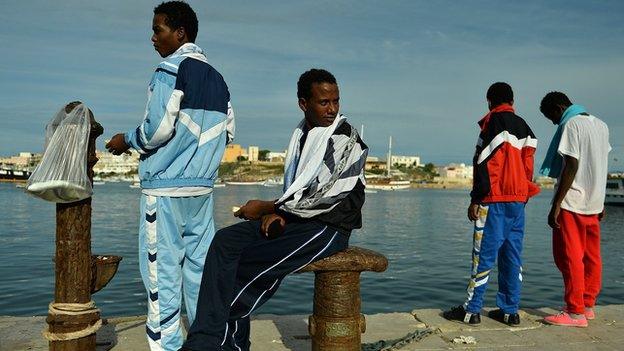'Treated like dogs': Migrants speak of horror at sea off Malta
- Published
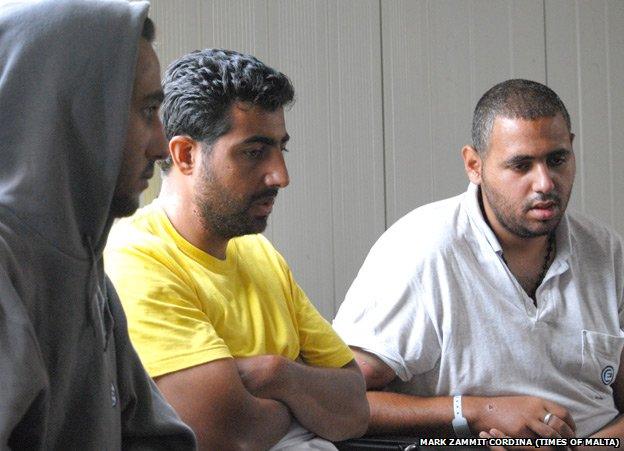
Palestinian survivors are in shock after their terrifying ordeal at sea
When at least 300 migrants drowned off Malta's coast on 12 September it was different from previous migrant tragedies in the Mediterranean.
It was downright mass murder, according to three survivors, external who spoke to the Times of Malta.
"We were treated like dogs all the way, but these Egyptian smugglers were the worst," said Palestinian Mohammed Ali Amadalla, 23, as he recovered in Malta.
Another survivor told the International Organisation for Migration (IOM) the people-traffickers had laughed as they witnessed the boat sink into its watery grave.
"After they hit our boat they waited to make sure it had sunk completely before leaving. They were laughing."
According to the testimonies of the 13 who lived through the ordeal, the smugglers deliberately rammed the migrants' boat after they refused to move to a smaller boat from the fishing vessel they were on.
"Half the people on board died instantly because they went down with the boat," Mr Amadalla said.
They spent two to three days in the sea until the first rescuers arrived. By then, most of them were dead.
The stories recounted were horrific. "I saw an entire Syrian family perish. First the father died, then the mother, then I was left to take care of their one-year-old boy… and he died in my arms," said Palestinian Mamoun Dougmoush, 27.
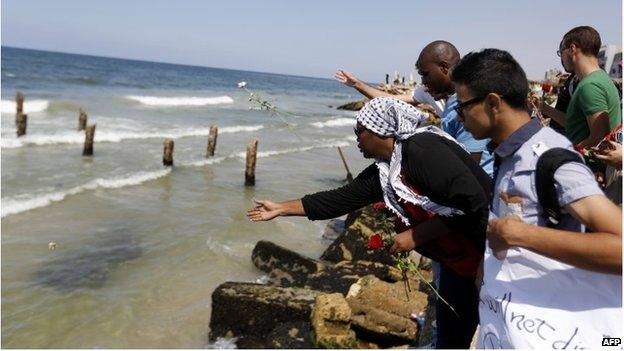
Palestinians in Gaza throw roses into the sea after hundreds of migrants, some from Gaza, drowned off Malta
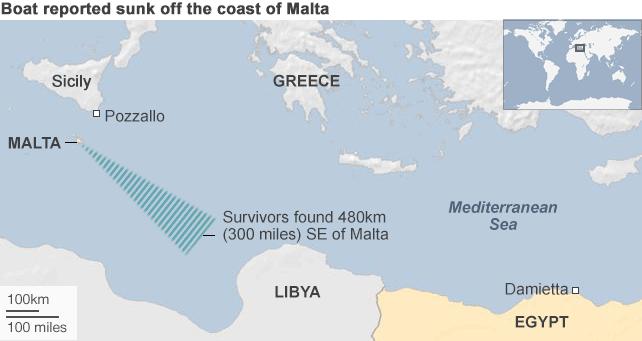
One survivor spoke of smugglers mocking the migrants after their vessel capsized. When one asylum seeker clung to the boat in a desperate bid to save his life, the smugglers chopped his hands off.
The migrants taking the fatal voyage said they paid around £2,450 ($4,000) each before they were taken down a long, dark path through tunnels, sometimes at gunpoint, and then boarded a boat at Damietta in Egypt. Some were fleeing Gaza.
Soaring numbers
According to the IOM, about 2,900 migrants have died this year in the Mediterranean, compared to 700 for all of 2013.
As the figures rise, Europe is being criticised for failing to act effectively to stop the deaths.
Maltese Prime Minister Joseph Muscat told the BBC that all responsibility for Europe's southern borders was falling on two member states: Italy and Malta.
"For all our efforts to save lives at sea using Malta's limited resources and Italy's bold intervention through Mare Nostrum - Italy's search and rescue operation - people are still dying, making this a veritable humanitarian issue nobody can turn a blind eye to.
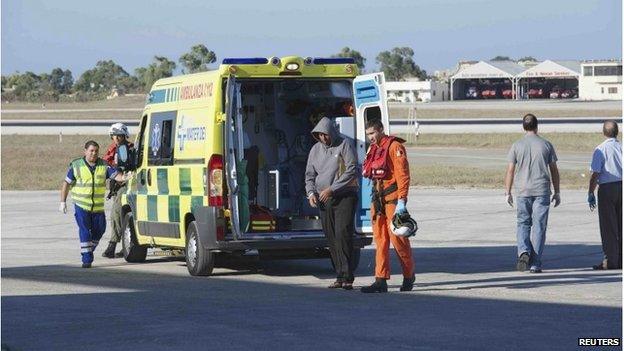
A migrant arrives in Valletta: Malta and Italy now receive the most migrants heading for Europe by sea
"Receiving calls late at night with news that hundreds have died at sea shocks me every time. Yet it seems the more it happens the less people take notice. We must fight this nonchalance and seek concrete solutions."
He said short- and medium-term solutions had been identified, but implementation was weak. The situation in Libya is getting worse and stability there is crucial to manage migratory flows, he said.
Maria Pisani from Integra Foundation, an NGO which works for migrant integration in Malta, said the conflicts in North Africa and the Middle East had contributed to a dramatic increase in the number of people fleeing their homes.
In an effort to prevent asylum seekers from reaching Europe, the EU has adopted a containment policy that includes beefing up border security.
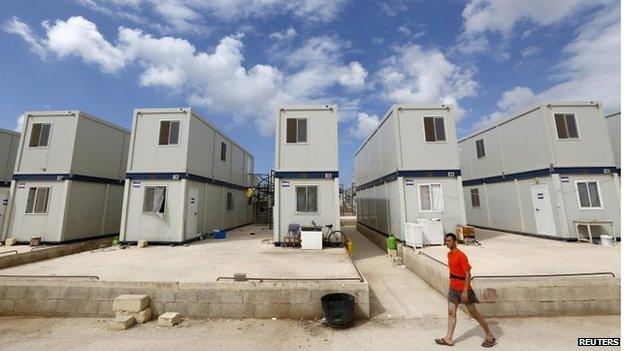
Malta has built container lodgings in Hal Far to cope with the influx of migrants
So asylum seekers are forced to seek alternative routes to get protection, and they turn to an ever more unscrupulous smuggling industry that pushes them to take more deadly routes, Ms Pisani said.
Europeans 'unmoved'
Europe was almost becoming immune to the loss of life at its doorstep, she complained.
"More concerned with populist politics, and for fear of being punished at the ballot box, EU countries are disregarding their international obligations, rights are being violated, and thousands of lives are being lost.
"Unfortunately, I think the Maltese people are largely unaffected by the loss of life - as is the rest of Europe.
"Europeans are pretty much either oblivious or unmoved; these drowning incidents barely make international headlines."
Her claims appear to concur with some Maltese media comment boards, which are rife with anti-immigrant sentiments.
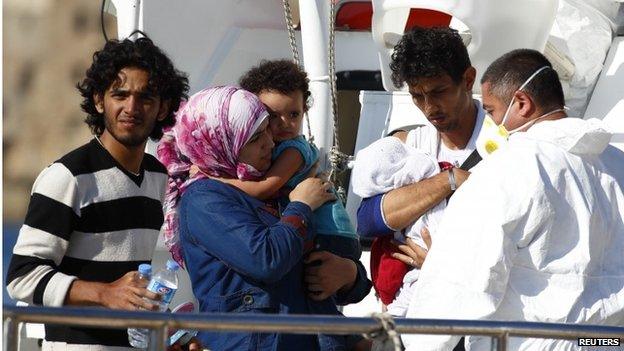
Migrants come from several African countries as well as war-ravaged Syria and the Gaza Strip
Some 19,000 migrants have arrived in Malta from Libya since 2002, a large number for the EU's most densely populated country, with 417,000 inhabitants.
Jon Hoisaeter, Malta's representative to the UN refugee agency UNHCR, said there was something fundamentally wrong in a world where people in need of protection were dying through desperate sea journeys.
"For the longer term there are, unfortunately, no easy answers. Parallel action is required on several fronts. But our common goal should be clear: deaths at sea can be prevented."
But as long as war and poverty persist, thousands are prepared to make the risky voyage by boat, desperate for safety and stability.
Mr Dougmoush hopes his harrowing voyage was not in vain.
In tears, he said: "I would just like a normal life where I can work and earn a living for myself and my family. Even after all of this, I hope this is possible."
- Published15 September 2014
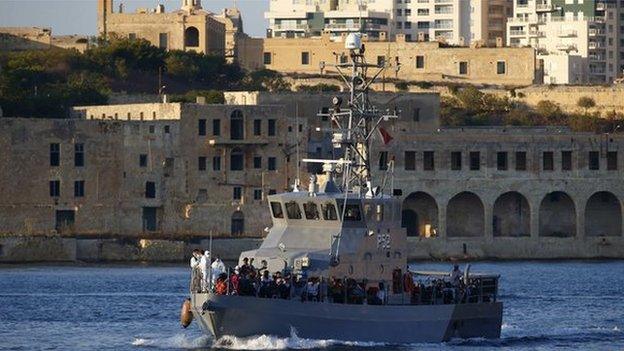
- Published15 September 2014
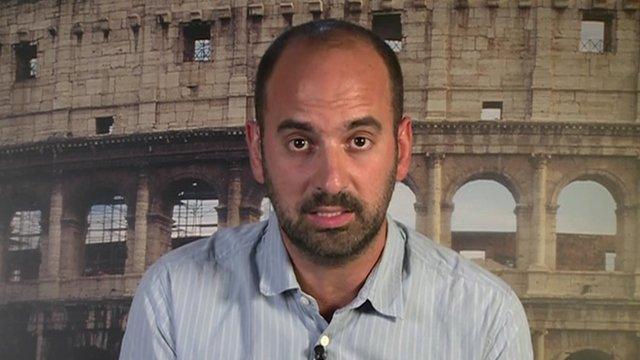
- Published15 September 2014
